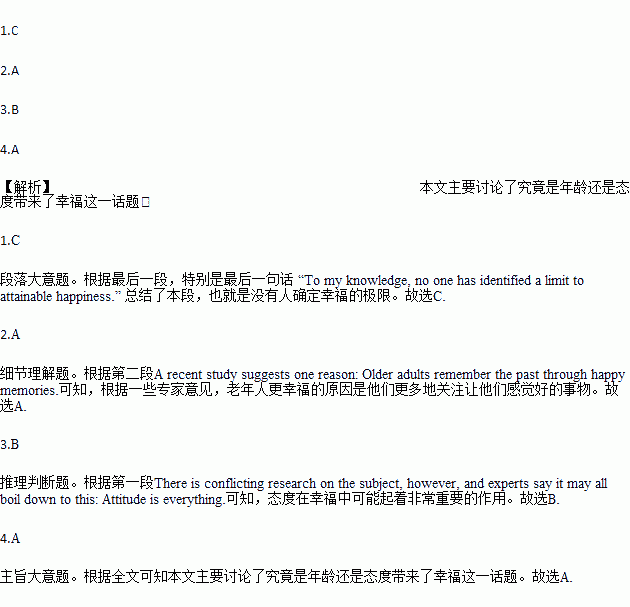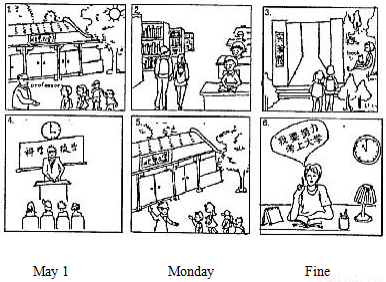题目内容
Aging brings wrinkles, sagging bodies and frustrating forgetfulness. But getting older is not all bad for many people. Mounting evidence suggests aging may be a key to happiness. There is conflicting research on the subject, however, and experts say it may all boil down to this: Attitude is everything.
Older adults tend to be more optimistic and have a more positive outlook on life than their younger and stressed opposites. The big question is why seniors are happier. A recent study suggests one reason: Older adults remember the past through happy memories. Aging can bring more cheer as people become more comfortable with themselves and their roles in society. The older adults said they were enjoying more time with their family, spending more time on hobbies and having greater financial security and did not have to work.
But others are doubtful about the link between happiness and growing older.
"The notion that those in old age are happiest is misleading," said Richard Easterlin, a professor of economics at the University of Southern California. "It is based on comparing people of different ages who are the same in terms of income, health, family life." Easterlin added, "When you take account of the fact that older people have lower income than younger, are less healthy, and more likely to be living alone, then you will find it hard to accept that they are happier.
In fact, scientists have found that as people age, their health declines and social networks disappear as their friends die, which can make the elderly less happy.
Even if one does give in to age's dark side, health and happiness don't always go hand-in-hand. It's all about attitude. Research by the University of Chicago’s Yang suggests that attitude about life and happiness, is partly shaped by the era in which a person was born. It turns out that individuals who adapt the best to changes also have the highest expected levels of happiness.
Despite the conflicting findings about aging and happiness, the good news is that there doesn’t appear to be a limit to how much happiness one can achieve in one’s life. “Most people desire happiness,” Easterlin said. “To my knowledge, no one has identified a limit to attainable happiness.”
1.What does the last paragraph mainly tell us?
A. The key factor to older adults’ happiness
B. There is a conflict between aging and happiness
C. No one can define the limit to happiness.
D. The relationship between health and happiness.
2.Why are some seniors happier according to some experts?
A. They focus on what makes them feel good.
B. They have their own circle of friends.
C. They have better income after retirement.
3.What can we learn from the passage?
A. People of the same age have the same sense of happiness.
B. Attitude may play a very important role in happiness.
C. People who adapt the best to changes are more likely to be unhappy.
D. Older adults who have more valuable life experience are more optimistic.
4.What’s the topic discussed in the passage?
A. Whether aging or attitude brings happiness.
B. Why seniors adapt the best to changes in society.
C. What the limit to an elder person’s happiness is.
D. How older people feel compared with younger people.
 探究与巩固河南科学技术出版社系列答案
探究与巩固河南科学技术出版社系列答案


 to have a conversation about the problem. 3. Each person should also have an opportunity to listen to the other person’s point of view.
to have a conversation about the problem. 3. Each person should also have an opportunity to listen to the other person’s point of view.